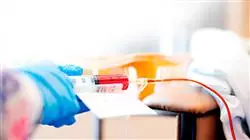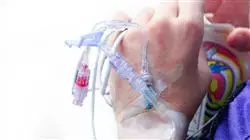University certificate
The world's largest faculty of medicine”
Introduction to the Program
Learn how to apply different questionnaires to assess the physical symptoms of cancer"

The interview is considered the most effective method of intervention in psychology because, under the right conditions, it provides a safe space for people to express their discomfort and concerns. In medicine, this tactic has been adapted to allow professionals to learn about a patient's history. This is why communication is very important when working in an oncology department.
With the Postgraduate diploma in Clinical Assessment in Psycho-Oncology, students will learn to master a series of skills that will allow them to express, in an assertive and empathetic manner, everything a patient needs to know about their disease and the care they should receive. In this sense, the elements of therapeutic communication as well as the attitudes and methods will be described in a didactic and practical way, making it effective and understandable.
On the other hand, the needs of those affected by cancer will be addressed by performing a physical and emotional assessment. For this reason, we will present the different questionnaires and methodologies that psycho-oncology has developed to identify the physical and psychological symptoms that generate discomfort in the patient. In this way, the student will be able to apply the protocol of each set of tests and make the relevant report.
Finally, the steps necessary to support psycho-oncologists in their research will be identified, as well as conducting their own work. Thus, they will be able to actively participate in the formulation of the question of interest, literature review, sample selection, data collection, identification of variables, etc. In short, this degree will become an excellent opportunity for medical personnel to train and improve their treatment of the patients under their care.
Formulate hypotheses and actively participate in research in psycho-oncology”
This Postgraduate diploma in Clinical Assessment in Psycho-Oncology contains the most complete and up to date educational program on the market. The most important features are:
- Practical cases presented by experts in Psycho-Oncology
- The graphic, schematic, and eminently practical contents with which they are created, provide scientific and practical information on the disciplines that are essential for professional practice
- Practical exercises where self assessment can be used to improve learning
- Special emphasis on innovative methodologies
- Theoretical lessons, questions to the expert, debate forums on controversial topics, and individual reflection assignments
- Content that is accessible from any fixed or portable device with an Internet connection
Gain experience and practice in applying a spiritual resources assessment scale to determine the patient's satisfaction with life"
The program’s teaching staff includes professionals from the sector who contribute their work experience to this training program, as well as renowned specialists from leading societies and prestigious universities.
The multimedia content, developed with the latest educational technology, will provide the professional with situated and contextual learning, i.e., a simulated environment that will provide immersive training programmed to train in real situations.
This program is designed around Problem Based Learning, whereby the professional must try to solve the different professional practice situations that arise during the academic year. For this purpose, the student will be assisted by an innovative interactive video system created by renowned and experienced experts.
Many patients communicate with their body that which they can’t put into words. Identify these discrete signals thanks to this Postgraduate diploma"

Provide a safe environment for your patient to discuss any concerns"
Why study at TECH?
TECH is the world’s largest online university. With an impressive catalog of more than 14,000 university programs available in 11 languages, it is positioned as a leader in employability, with a 99% job placement rate. In addition, it relies on an enormous faculty of more than 6,000 professors of the highest international renown.

Study at the world's largest online university and guarantee your professional success. The future starts at TECH”
The world’s best online university according to FORBES
The prestigious Forbes magazine, specialized in business and finance, has highlighted TECH as “the world's best online university” This is what they have recently stated in an article in their digital edition in which they echo the success story of this institution, “thanks to the academic offer it provides, the selection of its teaching staff, and an innovative learning method aimed at educating the professionals of the future”
A revolutionary study method, a cutting-edge faculty and a practical focus: the key to TECH's success.
The most complete study plans on the university scene
TECH offers the most complete study plans on the university scene, with syllabuses that cover fundamental concepts and, at the same time, the main scientific advances in their specific scientific areas. In addition, these programs are continuously being updated to guarantee students the academic vanguard and the most in-demand professional skills. In this way, the university's qualifications provide its graduates with a significant advantage to propel their careers to success.
TECH offers the most comprehensive and intensive study plans on the current university scene.
A world-class teaching staff
TECH's teaching staff is made up of more than 6,000 professors with the highest international recognition. Professors, researchers and top executives of multinational companies, including Isaiah Covington, performance coach of the Boston Celtics; Magda Romanska, principal investigator at Harvard MetaLAB; Ignacio Wistumba, chairman of the department of translational molecular pathology at MD Anderson Cancer Center; and D.W. Pine, creative director of TIME magazine, among others.
Internationally renowned experts, specialized in different branches of Health, Technology, Communication and Business, form part of the TECH faculty.
A unique learning method
TECH is the first university to use Relearning in all its programs. It is the best online learning methodology, accredited with international teaching quality certifications, provided by prestigious educational agencies. In addition, this disruptive educational model is complemented with the “Case Method”, thereby setting up a unique online teaching strategy. Innovative teaching resources are also implemented, including detailed videos, infographics and interactive summaries.
TECH combines Relearning and the Case Method in all its university programs to guarantee excellent theoretical and practical learning, studying whenever and wherever you want.
The world's largest online university
TECH is the world’s largest online university. We are the largest educational institution, with the best and widest online educational catalog, one hundred percent online and covering the vast majority of areas of knowledge. We offer a large selection of our own degrees and accredited online undergraduate and postgraduate degrees. In total, more than 14,000 university degrees, in eleven different languages, make us the largest educational largest in the world.
TECH has the world's most extensive catalog of academic and official programs, available in more than 11 languages.
Google Premier Partner
The American technology giant has awarded TECH the Google Google Premier Partner badge. This award, which is only available to 3% of the world's companies, highlights the efficient, flexible and tailored experience that this university provides to students. The recognition as a Google Premier Partner not only accredits the maximum rigor, performance and investment in TECH's digital infrastructures, but also places this university as one of the world's leading technology companies.
Google has positioned TECH in the top 3% of the world's most important technology companies by awarding it its Google Premier Partner badge.
The official online university of the NBA
TECH is the official online university of the NBA. Thanks to our agreement with the biggest league in basketball, we offer our students exclusive university programs, as well as a wide variety of educational resources focused on the business of the league and other areas of the sports industry. Each program is made up of a uniquely designed syllabus and features exceptional guest hosts: professionals with a distinguished sports background who will offer their expertise on the most relevant topics.
TECH has been selected by the NBA, the world's top basketball league, as its official online university.
The top-rated university by its students
Students have positioned TECH as the world's top-rated university on the main review websites, with a highest rating of 4.9 out of 5, obtained from more than 1,000 reviews. These results consolidate TECH as the benchmark university institution at an international level, reflecting the excellence and positive impact of its educational model.” reflecting the excellence and positive impact of its educational model.”
TECH is the world’s top-rated university by its students.
Leaders in employability
TECH has managed to become the leading university in employability. 99% of its students obtain jobs in the academic field they have studied, within one year of completing any of the university's programs. A similar number achieve immediate career enhancement. All this thanks to a study methodology that bases its effectiveness on the acquisition of practical skills, which are absolutely necessary for professional development.
99% of TECH graduates find a job within a year of completing their studies.
Postgraduate Diploma in Clinical Assessment in Psycho-Oncology
.
Clinical Assessment is a crucial tool for the appropriate psychological management of the oncology patient. As research and technology advance, new strategies and tools have been developed for the psychological assessment of these patients. Thus, it is essential that health professionals are updated in these methodologies to provide a holistic and comprehensive approach to the oncology patient. With this objective in mind, the Postgraduate Diploma in Clinical Assessment in Psycho-Oncology has been designed, taught 100% online to ensure optimized learning from the comfort of your home.
Complete your update in only 6 months
.
Do you want to perfect your communication techniques with the oncology patient and learn about the latest psychological measurement instruments? The Postgraduate Diploma in Clinical Assessment in Psycho-Oncology will help you achieve your goals! Get this very complete learning from the hand of the best teachers, who have extensive professional experience in the field of Psycho-oncology. Enroll and enjoy a unique academic opportunity!







